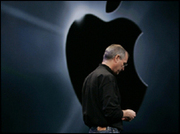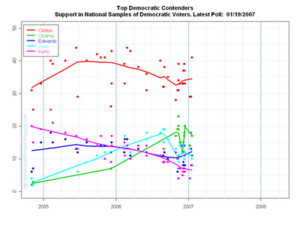Despite the similarity in their ages (they’re both born in 1955, same year as me) Steve Jobs and Bill Gates are men of different times.
Gates is of the 1980s, when computing was defined politically, through software. He became the anti-IBM candidate for the future of computing, then outmaneuvered IBM at the bottom of the stack, in the operating system, where it had made itself vulnerable.
Jobs is a man of today, when computing is defined in terms of marketing, where it has become a mere extension of consumer electronics. Image as defined by Hollywood, a focus on cool design and simple return policies, has always been his metier. You pay for that — you’ve always paid more for Apples — but the value proposition is always there.
When people like Bill Thompson of the BBC (the picture is from his column) attack Jobs, they see what isn’t there rather than what is, saying Apple has "a tiny share of the computer market and an increasingly perilous first mover advantage selling portable music players," then complaining that we pay it too much attention.
Thompson misses the point completely. Jobs defines the Gadget Decade because everything comes from China, everything is
mass-produced for one world market, and Apple is the only company that
has been able to put a patina of cool on any of it. Apple created the
category it dominates, it made it happen. And that low computing market share can
change, at least on the desktop, because for the first time Apple has
the capability to produce as many Macs as the market demands.
Instead of focusing on Jobs, and his battle with the music industry,
Thompson would be better served focusing on the forces that made him, and those
that can really break him. A single Chinese innovator, a single Chinese
teenager, could easily overthrow the World of Jobs at a stroke, by
designing something cool and bringing the intellectual property back to the
place where it’s manufactured.
Somewhere, on the streets of Shanghai, there’s a Jobs and a Gates.
There are millions of them, but there are two special ones, who are
going to turn the computing world on its ear because they can.
Just as, in the 1970s, Gates and Jobs could. Because America was where
the innovation was happening, and America was where it was being made.
It is that change that is the story of our time, the movement of youthful opportunity from the West Coast of the U.S. to the East Coast of China.
Yes, what Jobs offers now is a sort of Wizard of Oz for technology.
Behind the flash it’s all just a middle-aged guy pulling levers and
pretending he’s done more than he actually has.
But who’s fault is that, and what comes next as a result?
I don’t think Thompson really wants to know.













I think it’s useless to compare Gates and Jobs. They were never really playing the same game at all. The real comparison and issue of Jobs envy is Michael Dell and Jobs. The were playing the same game — selling computer systems. The funny thing is that Dell won, but then he developed Jobs envy. The success of Dell was customization. They were the place to go to get exactly the PC you wanted at a reasonable price. Apple is the antithesis to this idea. Now look at Dell. The products just aren’t that customizable (in terms of what you can order from Dell) and what choices they do have often aren’t that reasonably priced. The recent problems at Dell are definitely attributable to Jobs envy.
I think it’s useless to compare Gates and Jobs. They were never really playing the same game at all. The real comparison and issue of Jobs envy is Michael Dell and Jobs. The were playing the same game — selling computer systems. The funny thing is that Dell won, but then he developed Jobs envy. The success of Dell was customization. They were the place to go to get exactly the PC you wanted at a reasonable price. Apple is the antithesis to this idea. Now look at Dell. The products just aren’t that customizable (in terms of what you can order from Dell) and what choices they do have often aren’t that reasonably priced. The recent problems at Dell are definitely attributable to Jobs envy.